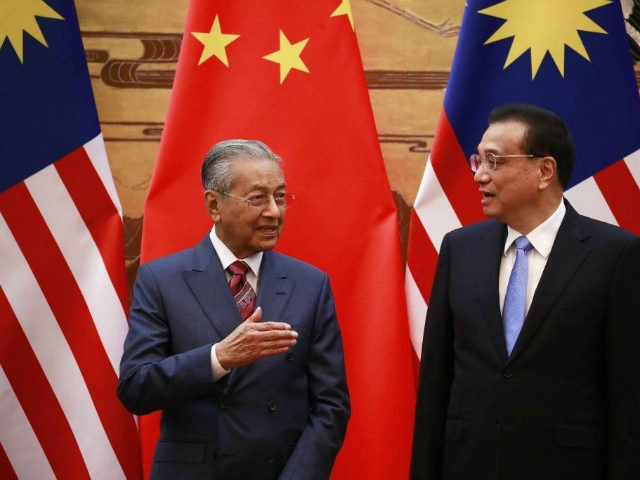The government of Malaysia confirmed on Thursday the release of 11 Uighur refugees who entered the country illegally after breaking out of a Thai immigrant detention center, allowing them to travel to Turkey as they had requested.
The Uighur refugees originally came from China, where the ethnic minority makes its home. The Uighurs are a Turkic people who speak a Turkic language, Uighur, are predominantly Muslim, and have few ties to the majority Han people of China. As a result, the ruling Communist Party in Beijing has launched an elaborate crackdown program in Xinjiang province, where most Uighurs live, which bans children from mosques and forces Uighurs believed to be insufficiently integrated in Han society to undergo “ideological training” in internment camps.
The Malaysian government confirmed this year that China demanded that Kuala Lumpur return the 11 refugees to the country. Malaysia’s refusal is the latest in a series of acts by the government of recently elected Prime Minister Mahathir Mohamad indicating a desire to move further away from Beijing’s influence.
According to Reuters, the attorney representing the 11 men – Zakaria Arman, Salehudin Ali, Jaefar Amin, Osman Abbas, Alim Osman, Asen Ziyali, Taher Kasim, Ibrahim Rexiti, Nurudin Muhammad, Abdul Kader, and Yusof Ahmed – announced Thursday that Malaysia had chosen to deny China’s request and instead honor the men’s desire to be sent to Turkey. The prosecutors bringing the case against the men to trial reportedly dropped the charges for “humanitarian” reasons. The men reportedly arrived in Turkey on Tuesday.
The refugees reportedly broke out of their immigration detention center in November by drilling through the walls of the prison and walking through the Thai-Malaysian border. Malaysia’s New Straits Times reported in April that the men were formally charged that month with illegally entering the country in January, a testament to the distance between the prison and the border. The defense pleaded not guilty and requested they return to Turkey, where they claimed citizenship.
Prior to the official hearing, in February, Malaysian authorities confirmed that the Chinese government was keen to return the men to Chinese territory, where they would likely face charges of violating China’s strict travel rules for Uighurs. Officials emphasized that they did not feel “pressured” by China to return the men.
“It is the responsibility of the police to investigate and they are in fact working with their counterparts from China on this issue. Malaysia stand by the Mutual Legal Assistance agreement it has with China, so there is no issue of any pressure from either party,” Deputy Prime Minister Datuk Seri Ahmad Zahid Hamidi said in February. “So any parties or other countries should not worry with the steps taken by Malaysia to investigate or even if when we later decide to extradite the 11 ethnic Uighur people.”
Zahid emphasized that Malaysia sought a “diplomatic” solution to resolving the status of the migrants involved.
“The case is currently jointly managed with Thailand, where some of them (Uighurs) are being detained there (as well). We will take an approach which will not spurn the sentiments of the countries (involved in the issue). It will be the best of solutions,” he told reporters. “We also take into account the sentiment of humanitarian rights groups in the region and the rest of the world.”
At the time, Uighur advocacy groups, human rights NGOs, and Western governments, such as the United States, noted that China launched a repressive campaign in the past two years to eradicate Uighur culture, forcing Uighur children to learn Mandarin, Uighur drivers to install government-monitored GPS systems in their cars, and interning between one and two million Uighurs in indoctrination camps.
“We are concerned by media reports regarding Malaysia’s possible deportation of Uighur individuals to China,” a State Department spokesperson told Reuters in February. “We urge Chinese authorities to uphold international human rights norms with regard to any individuals who have been returned to China, and to ensure transparency, due process, and the safety and proper treatment of these individuals.”
Malaysia’s attitude towards China shifted dramatically following the election of Mohamed in May, independent of the Uighur issue. Mohamed has cut billions from budgets meant to pay into China’s One Belt, One Road (OBOR) global infrastructure plan, arguing that the country cannot afford to be as indebted to China as the plan would make it.
“I believe China itself does not want to see Malaysia become a bankrupt country. China understands our problem and agreed,” Mohamed said in August, after canceling two major OBOR projects worth $22 billion in August. “It’s all about pouring in too much money which we cannot afford, we cannot repay and also because we don’t need these projects for Malaysia at this moment. With that debt, if we are not careful we can become bankrupt.”
The move to defend the Uighurs, however, is a rare one on behalf of the leader of a majority Muslim country. The Turkish government, which claims an ancestral tie to the Uighur people, has largely abstained from criticizing human rights violations against them, safe for mild criticism in 2015, in part fearing a financial reprisal from Beijing. Only the government of Pakistan, which is also heavily indebted to China, has issued statements urging the Communist Party to respect the rights of Uighurs.

COMMENTS
Please let us know if you're having issues with commenting.